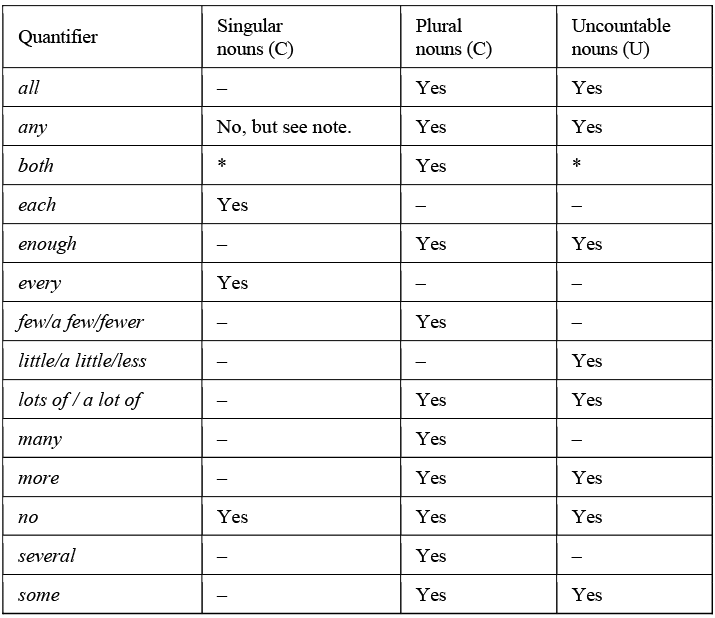Determiner & Prepositions | English Olympiad for Class 6 PDF Download
Determiners are words which are placed before nouns either to refer or quantify. Some commonly used determiners include:
- Article - a/an/the
- Demonstratives - this, that, these, those
- Possessives - my, your, his, her, its, our, their
- Quantifiers - few, fewer, little, many, much, more, most, some, any etc.
Sometimes, we also use numbers to quantify, while at times, we don’t use a determiner before the noun. We call this as ‘zero determiner’.
Articles
There are three articles- a, an, the.
While ’a’ and ‘an’ are referred to as indefinite articles, ‘the’ is referred to as definite article.
The is used with ordinals.
For example:
(a) He was the first student to finish his homework.
(b) The second chapter of the book is very interesting.
The is used before an adjective when it implicates a ‘noun’.
For example:
(a) The poor are always with us. (Here, ‘poor’ means poor people, which is understood.)
(b) The weak and the strong. (Here weak means weak people and strong means strong people.)
An is placed before an abbreviation if the first letter of an abbreviation is F, H. L, M, N, R, S or X.
For example:
(a) An MBA was required for the post.
(b) An SUO is an officer of high rank
A and an are used with words ‘few’ and ‘little’ if they refer to a small number or a small amount. Words ‘few’ and ‘little’ without the articles mean almost none.
For example:
(a) We have little time to spare. (means almost no time)
(b) We have a little time to spare. (means some time)
(c) Few persons were present at the meeting. (means almost no one was present)
(d) A few persons were present at the meeting. (means some were present)
A is used in the following senses:
(A) In its original numerical sense of one.
For example:
(a) Not a word was said.
(b) A word to the wise is sufficient.
(B) In the vague sense of a certain.
For example:
One evening a beggar came to my door.
(C) In the sense of any, to single out an individual as the representative of a class.
For example: A pupil should obey his teacher.
(D) To make a common noun of a proper noun.
For example: A Daniel came to judgement. (A Daniel = A very wise man)
The is used with names of gulfs, rivers, seas, oceans, groups of islands and mountain ranges.
For example:
The Persian Gulf, The Red Sea, The Indian Ocean, The British Isles, The Alps.
The is used before the name of certain books.
For example: The Vedas, The Puranas, The Ramayana.
But we never say ‘The Valmiki’s Ramayana’. The is not used when the name of a book is mentioned along with the author’s name. So, ‘Valmiki’s Ramayana’ is correct.
The is used before the names of things unique of their kind.
For example: the sun, the sky, the ocean, the sea.
The is used before a plural common noun if it refers to a particular group among the class and not the whole class.
For example: Drive away the cows from the field.
The is used before a proper noun only when it is qualified by an adjective.
For example: The great Rani of Jhansi, the immortal Kalidas.
The is used before the superlatives.
For example:
(a) Sachin is the best batsman in the world today.
(b) The best person should win.
The is used before a noun (with emphasis) to give the force of a superlative. For example : The verb is the word (the chief word) in a sentence.
Demonstratives
These are used to indicate the position or location of a noun from speaker’s point of view.
- ‘This’, is used for singular nouns near the speaker.
- ‘These’, is used for plural nouns near the speaker.
- ‘That’, is used for singular nouns far away from the speaker.
- ‘Those’, is used for plural noun s further away from the speaker.
This book is mine. That box has chocolates.
These dresses are new. Those days are long gone.
Possessives
They show possession or ownership of a noun. Possessive determiners are different from possessive pronouns as they can be independent or can stand alone.
- His father runs a bakery.
- I love my home.

Quantifiers
As the name suggests, they are used to quantify. It answers questions like ‘How much?’ or ‘How many?’
- Do you have any money?
- She has few friends.

Prepositions
Prepositions are words that are placed before a noun or pronoun and show their relationship with other words in a sentence.
They describe the following:
- The position of something -
The books are on the shelf.
This bag was under the chair.
- The time when something happens –
Shortly After their marriage, they moved to Delhi. The office starts at 10.00 am.
- The manner in which something is done -
She comes to work on foot.
He left home without a word.
Some prepositions are made up of more than one word.
- They moved here (because of) the baby.
- The hotel is perched (on top of) a cliff.
|
25 videos|38 docs|66 tests
|
















